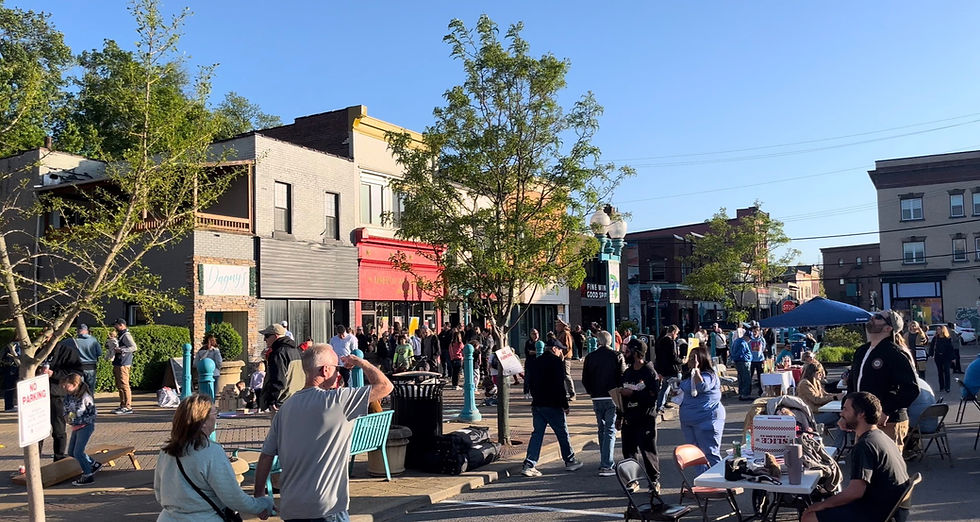Making Your Garden Your Grocery Store
- Erica Cebzanov
- Apr 1, 2021
- 3 min read
During this uncertain time, spring can serve as a new beginning: a chance to weed out the old and see what blossoms. Many people are using their time at home to grow COVID-19 gardens full of produce and edible flowers.
Hahn Nursery owner Laurie Curl said that business has been strong during the pandemic. After working at the garden center for more than 30 years, she took over ownership following Louis Hahn’s death last June. “We were very fortunate to not have been majorly affected during the pandemic like so many other businesses,” she said.
Ryan Walsh, Grow Pittsburgh’s development and communications director, said that interest has shot up ‘wildly’ from people contacting the nonprofit that serves as a resource for backyard, school, and community gardeners across the Greater Pittsburgh region. The organization prioritizes low- to moderate-income communities and has a mission of teaching people to grow food.
There are many benefits to growing one’s own food, according to Dr. Sally Lipsky, who has a doctorate of education and founded Plant-Based Pittsburgh, which promotes plant-based eating. She said that it’s convenient to have fresh produce and edible flowers readily available in the garden. Gardeners also have a greater awareness of what pesticides–if any–are used on their own plants.
Curl used gardening as a way to educate her young nephew and expand his palette. “I grew a new tomato called a tomato berry for my nephew last year, and he really enjoyed it,” she said. “He had not eaten tomatoes beforehand, but he liked picking them right off of the plant. That's when they're sweet and warm. It really made him like them.”
Gardening may increase the availability of produce in food deserts, or areas without close access to grocery stores, and tackle food insecurity, Walsh said. It can also improve the environment and provide a habitat for pollinators like butterflies and bees.
“There's so much research behind the fact that growing your own food gives you such a sense of connectiveness with nature and the planet. And it gives you a sense of self-satisfaction and improved mental health,” Lipsky said, adding that gardening is a good physical activity as well.
Walsh said that southwestern Pennsylvanian gardeners are fortunate to reside in the U.S. Department of Agriculture’s hardiness zone six, with its moderate temperatures and long growing season.
“We can really grow a lot of staples: potatoes, carrots, and all sorts of really high-nutrient, dense vegetables like kale, cabbage, collards and spinach,” he explained. Walsh also mentioned the abundance of corn, green beans and stone fruit.
Lipsky said that she has had success growing lettuce, tomatoes, squash, herbs, sweet peppers and beans, and Curl recommends that novice gardeners start with tomatoes, peppers, cabbage and lettuce. People can dry, can and/or freeze their crops to preserve them.
Don’t have yard space of your own to garden? No problem. Start small by planting herbs indoors in small pots. Walsh recalled that his first garden as a young adult consisted of a cherry tomato plant grown in a bucket on a fire escape. Currently, Lipsky prefers growing vegetables in containers on her deck because she thinks that it gives her a greater sense of control over invasive animals and insects.
“If you don't have the space or you don't want to dig in the ground and you have containers, it's very easy to pick up the soil that's already mixed,” Curl said. “You also have to take into consideration the sun and the soil type in your yard.”
Experts at your local garden center can provide further advice. Grow Pittsburgh also holds workshops on container gardening and other topics.
Another option is to join a community garden or farm program. Community gardeners access garden allotments for growing their crops, while community farmers collectively garden land for personal use, sale or donation, according to the Grow Pittsburgh website. Visit www.growpittsburgh.org/garden-and-farm-resources/growers-map to view a map of various gardens of all sizes throughout the region.
Allegheny County residents starting their gardening projects can visit Grow Pittsburgh’s Garden Resource Center for a variety of gardening tools and materials, including tillers, string trimmers, wheelbarrows, organic compost, soil, mulch, gardening literature and more—all of which are included with an annual membership to the nonprofit. Walsh said that the camaraderie and information exchange among gardeners at the center is invaluable.
Curl suggested searching online for gardening ideas, then following up with garden center staff for personal assistance. “They will point out the no-fail, easy staples to grow. Keeping it simple your first time is very important,” she said, adding that garden experts can explain which plants are easier to grow from seeds versus seedlings.
Likewise, Lipsky stresses the importance of simplicity. “You have to play around, have fun with it and see what works and what doesn't work,” she said. “That would probably be my main suggestion. It is trial and error for me.”












































Your feedback helps the company understand your needs and preferences, leading to better product selections, improved customer service, and a more enjoyable shopping environment for everyone. As shopping experience is the critical component of every retail store. Your input on survey page at kroger.com/feedback about the products, services and overall store shopping experience makes a difference, and together, we can help Kroger continue to provide excellent service and products. Companies like Kroger look at the customer feedback process not only as a chance to listen but also as an opportunity to subtly influence customer perceptions.
fyi: Wed., April 7, 7-8 pm ET, Plant-Based Pgh. is hosting a Gardening for Beginners workshop. Register @ PlantBasedPittsburgh.com.